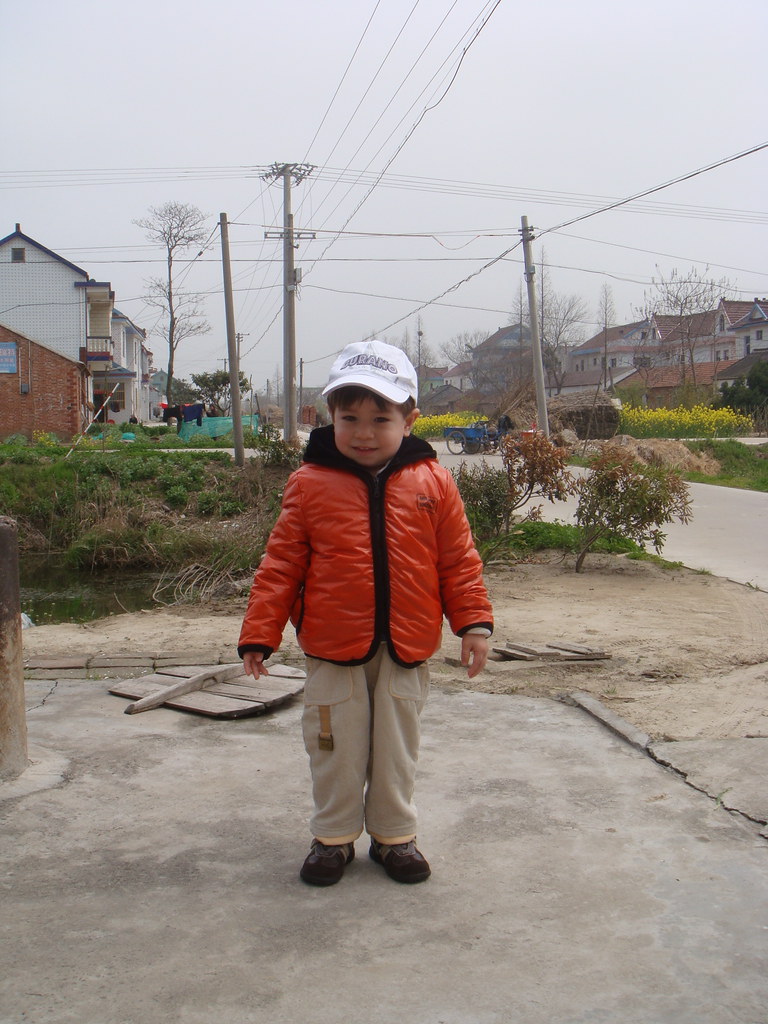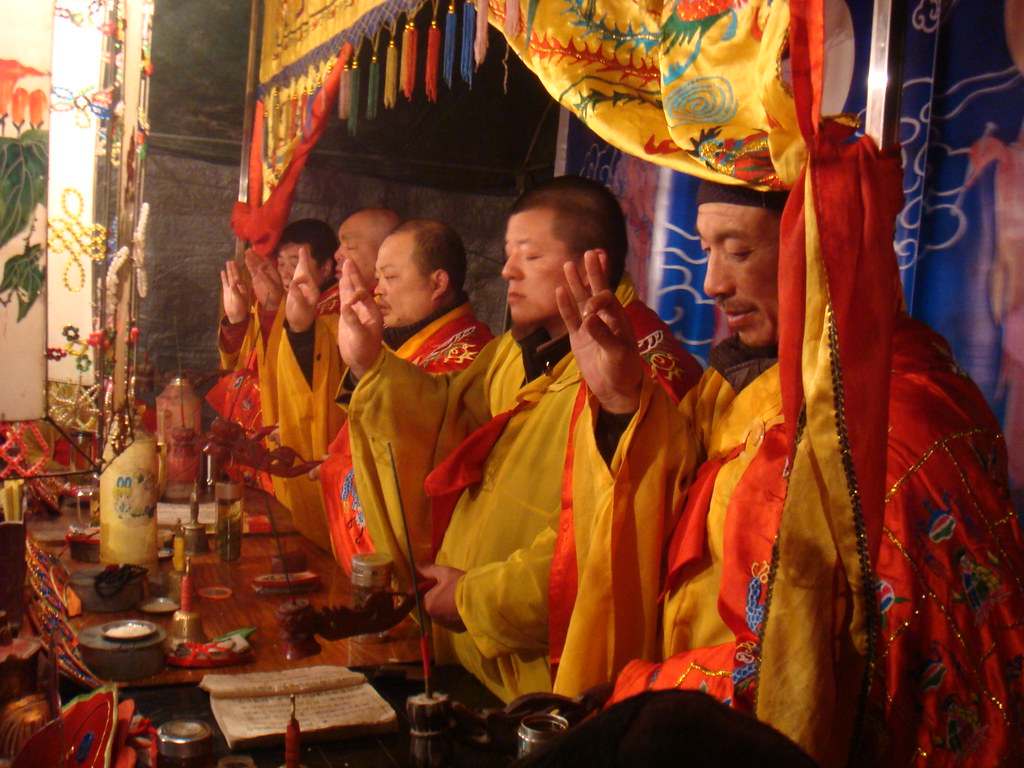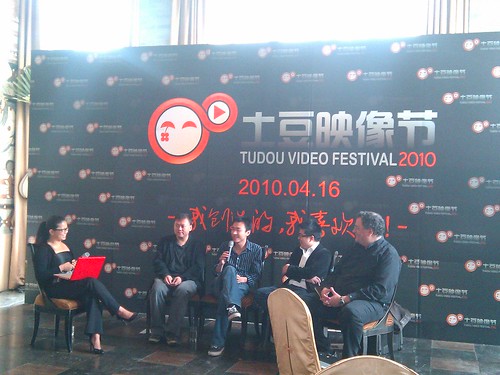Last weekend it was Qingming Festival (Tombsweeping Festival) in China, the day that you visit the graves of your ancestors to pay your respect to them. Because nowadays many Chinese in big cities have cars this means huge traffic jams everywhere, so we decided to go a week later. Yesterday we made the trip to a small village in Eastern Jiangsu province, a few kilometers from the coast, to visit the grave of my wife’s paternal grandmother. It was a big occasion, because it would have been her 100th birthday (she died a couple of years ago).
My wife’s paternal family moved to Shanghai several generations ago (her grandfather even owned a big Shanghai taxi and rickshaw company in the 1930s, but that’s a story for another time), but the ancestral graves are still in the area that the family originally came from. So once a year the city dwellers come to visit the people who still live there around the Qingming Festival. This year was the first time for both me and my wife and it was quite an experience.

The village itself is quiet small but spread out over a large area, and also very poor. I was told that I was the first foreigner to ever visit the village. That doesn’t mean that people have never seen foreigners, but my son Scott and me were still quite a sight. People were literally coming out of their houses to look at us and one person almost fell down on her scooter because she kept on looking at us after passing us.
What struck me, was that there were no young or middle-aged people in the village. The average age seemed to be around 60. Every single younger person was working in cities all over China to earn money to hopefully later be able to build a house in the village. All the fields around the village were managed by elderly people, a very strange sight. Of course I had heard about this before, but seeing it in person is still a strange experience.
I wonder what will happen in 10 years when this generation is too old to take care of the crops. Will their kid(s) have earned enough to take over? Or will they stay in the cities to earn money? I assume it’s most people’s dream to come back to their home village eventually, but there could be some major changes in these villages if the migrant workers in the cities integrate more and do not want to go back to the hard life in the countryside.

Because life is hard there. Houses have no heating, but it seems nobody cares. In order to cook you first have to cut wood and if you need water you have to get it out of a well. Bathrooms do not exist, and the ‘toilet’… Well, I decided not to check that out. Live evolves around working, every day of the year. But people seem happy, everybody I met seemed relaxed and smiled. Very different from what you see in Shanghai, and especially in Western countries, where people generally seem a lot more unhappy than here.

I enjoyed being there for a day, but I was also happy that it was just one day. It’s peaceful and quiet. Hardly any cars, most people walk or have electric bikes or scooters. The pace of life seems to be very slow, you grow what you need for your food and the rest you may sell in the market. There is electricity, but I did not even see TV sets in most houses.

After driving for several hours we arrived in the village just in time for lunch. A big lunch with at least 15 dishes. Very tasty actually, much better than I had expected (I had brought some food from Shanghai just in case, but I did not touch it). After lunch we went to two graves that were in the fields behind the house, where the direct family prayed and we burned money and valuables (all fakes) for the afterlife. I had seen this before in pictures, but had never experienced it myself.

After that we had several hours for ourselves, but because there was literally nothing to do in the village we decided to drive to a nearby town to rent a hotel room with heating. Scott was getting tired and he could sleep there, and we would have a look around town. The hotel room we found was not bad, certainly not for the price of RMB 80 (EUR 8 or USD 11) per night. And the heating worked, something I was quite happy about after several hours in the cold (it wasn’t that cold outside actually, but we were close to the sea and inside the houses it was very chilly).

The town itself was a 4th tier ‘city’, which means that also here there was nothing to do. No place to drink tea or coffee, no bars and just one restaurant that only opens in the evening (and also did not turn on the heating). Also here hardly any cars, people are still too poor to be able to afford one. Also here everybody looked at me, but I was told that in the past an American and a Canadian had stayed here. When later Scott woke up he was the complete center of attention. Nobody dared to talk to us, but they were all talking among themselves about us.

At night we had the big ceremony for the 100-year ‘birthday’ of my wife’s grandmother. This was a huge happening. A tent was set up in a field next to the grave, and inside the tent there were many tables full of food. Around 7 PM monks entered the tent and started chanting prayers. Next to the tent was an old house completely filled with offerings for the grandmother: from bags of fake money, to a big paper boat, 2 cars (with drivers!) and even a house. I had never seen this before.

After the dinner had started we stayed on for a while, but we decided to leave before the end because Scott had to sleep. We heard the next day that the party went on until 2:45 AM because they had so many things to burn, and they could only burn them while the monks were singing. When everything was done there were still fireworks to make sure that everybody in the neighboring villages would wake up as well.

For me this was a great experience. I have seen and done a lot of things over the years in China, but a ceremony like this is not something you can normally participate in as a non-Chinese. I liked being in the village and we will probably go back here in the future with the kids to further explore the coastal area. But I’ll make sure to go a bit later in the year when temperatures are more bearable!
For some more pictures of the day, see this set on Flickr.
 As you are probably aware, a big cloud of volcanic ash is disrupting air traffic in big parts of Europe. Just now a former Spil Games Asia colleague (who now works at Spil Games in Hilversum) gave me a call. He is on holiday in China and planned to fly back to Amsterdam today. But because of the ash cloud there are no flights to Europe, so he had to rebook his ticket. And guess what: the earliest plane KLM can put him on will leave in 10 days time! He told me he first thought he misunderstood what KLM was telling him, but all earlier flights are fully booked and they could not rebook him on other airlines either (I assume they are also fully booked).
As you are probably aware, a big cloud of volcanic ash is disrupting air traffic in big parts of Europe. Just now a former Spil Games Asia colleague (who now works at Spil Games in Hilversum) gave me a call. He is on holiday in China and planned to fly back to Amsterdam today. But because of the ash cloud there are no flights to Europe, so he had to rebook his ticket. And guess what: the earliest plane KLM can put him on will leave in 10 days time! He told me he first thought he misunderstood what KLM was telling him, but all earlier flights are fully booked and they could not rebook him on other airlines either (I assume they are also fully booked).
 Yesterday the
Yesterday the 









